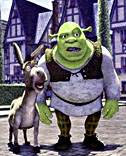
Movie Guru Rating:

Comment
on this review
| |

The self-conscious Shrek is too hip for its own good
by Jesse Fox Mayshark
Oh irony, where is thy sting? There's a scene in the movie Roxanne where Daryl Hannah says something sarcastic to Steve Martin and he takes her literally.
"No," she says, "I was being ironic."
"Oh, irony," he says. "We don't have that around here anymore."
Would that it were so. The wave of pop-culture irony that consumed America in the 1990s does seem to be ebbing, but the flotsam and jetsam are still kicking up sand. And the results are predictably soggy and grainy.
Not that irony doesn't have an honorable place in the artsy realms. Check out the Warhol exhibition at the Knoxville Museum of Art for a primer.
But Warhol was a provocateur. Most latter-day pop irony isn't so much about challenging you as flattering you. As David Foster Wallace said in a quote that I'm too lazy to look up, irony in late 20th century America became an all-purpose reflex, a way to fend off things we either didn't understand or didn't want to think about, a shortcut to being cool by appearing cool, a refusal to be surprised or passionate about anything. Kurt Cobain, who was fiercely un-ironic, said it all in the misunderstood anthem that kicked off the last decade: "Oh well, whatever, never mind."
So anyway, here we have Shrek, which is a cartoon, or as we're calling it now, a "digital animation."
I like cartoons. I was raised on them. Even my subsequent readings about the queasy business and political machinations of Mr. Walt Disney couldn't dampen my perpetual enjoyment of Snow White and Fantasia and the best of the Donald Duck and Bugs Bunny shorts. And whatever else they are, animated films have become our preferred medium for fairy tales and folk legends. How many children in the last 50 years ever read a Brothers Grimm story before they saw the movies of them? And even sleeked up and Disneyfied, a story like Cinderella or Sleeping Beauty carries essentially the same romantic charge, the same tingling awareness of darkness in the world, that it did when told around the hearth two centuries ago.
But apparently, the ace marketers who run modern movie studios have decided kids are too hip and cool for that sort of thing. Fairy tales? Oh, please. Thus we've seen the steady degradation of the Disney product over the past decade, with de rigeur pop-culture references built in for the parents as much as the children. This cheapens and limits the entire enterprise; will Aladdin, with all its Robin Williams riffing, resonate with anyone in 60 years the way Snow White does now?
Shrek is the second glossy digital cartoon from the DreamWorks company. It's about a grumpy green ogre, a gross but essentially decent fella, who lives in a swamp. When the pint-sized local lord decides for unclear reasons to rid the land of all fairy-tale characters, Shrek's swamp is turned into a sort of concentration camp, overrun by elves and witches and the three bears and Pinocchio, etc. The evil Lord Farquaad lives in a Disneyland-style theme park called Duloc, whence Shrek must journey to plead for his swamp's return to serenity. Farquaad instead sends Shrek (along with a donkey sidekick referred to only as Donkey) on a mission to rescue a princess who's being held captive by a dragon.
None of this makes much sense narratively, which is the movie's first sin; fairy tales require a consistent internal logic. And it's mostly an excuse for a lot of cheap and sometimes nasty jokes—did we really need to see Geppetto selling Pinocchio for a handful of coins? There's a meta-narrative at work, too: DreamWorks co-founder Jeffrey Katzenberg used to be second-in-command at Disney, and the character of Farquaad is supposedly modeled on his old boss Michael Eisner. Why an audience of children, or anyone for that matter, should care about the rivalry of two movie moguls is beyond me, but somehow it's supposed to be funny.
In fact, there are many entertaining moments in Shrek, partly due to sharp voice-acting by Mike Myers in the title role and Eddie Murphy as the donkey. But Murphy was funnier providing a similar role in Disney's mildly enjoyable Mulan, and many of the gags are either too obvious or too shrill to work. (It's funny, for example, when Shrek keeps yelling at Donkey not to sing whenever the movie threatens to break into a Disney-style schmaltzy musical moment. But it's just disturbing when the princess, while singing a Snow White-style duet with a bluebird, hits a high note that causes the bird to literally explode.) The soundtrack is loaded up with bizarre, misplaced attempts at coolness; why do we have to listen to Smashmouth over the opening credits?
The overall message seems to be that children reared on The Simpsons and WWF title matches will no longer sit still for good old-fashioned storytelling. Which I don't believe for a second. One thing that struck me about Shrek was that its jokes assumed a familiarity with the entire cartoon feature genre that many 8-year-olds probably have yet to acquire. Depressingly, it sends them the message that, whatever age they are, they're already too cool for fairy tales, for real struggles between good and evil, for stories of true love and happily ever after. It's one thing to stew in this cynicism ourselves; it's another to market it to grade-schoolers.
The real irony, of course, is that Shrek does indeed have a happy ending. It even closes with a straight-faced rendition of The Monkees' "I'm a Believer," exposing all the preceding archness for the shallow, callow dodge it is. By which point all you can do is wonder why they didn't just acknowledge that up front and make a different, and better, movie?

May 24, 2001 * Vol. 11, No. 21
© 2000 Metro Pulse
|